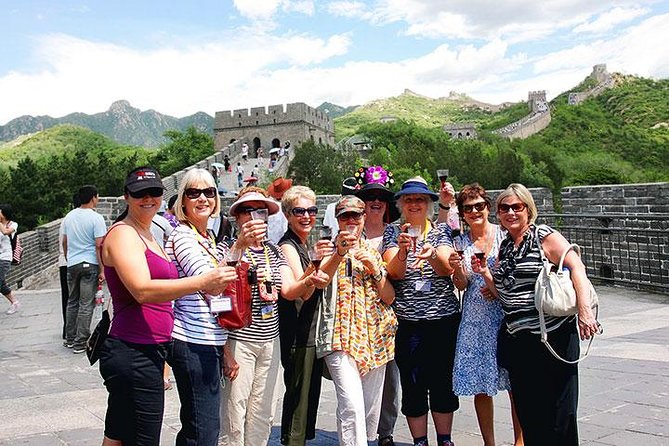20 Free Facts For Picking China Tour Websites
Wiki Article
Top 10 Tips On Regional Specialties When Shopping In China
1. Do your research before you goTip Know what each area is known for. Suzhou, Jingdezhen and Tibet are all known for their distinct products.
Pros: You can concentrate your energy on shopping, and you'll save time.
Con: You should be familiar with highlights in the region.
2. Buy Local to Guarantee authenticity
To ensure authenticity and high-quality To ensure authenticity and quality, buy items directly from the origination point.
Pro: Reduces the risk of copyright goods and helps local artisans.
Cons: Traveling to less-touristy or rural regions is possible.
3. Take a look at the Artists' Workshops.
Select small-scale workshops or hubs for artisanal over the usual shops.
Pro: Gives you a more knowledge of the craft, and also guarantees that you are buying directly from the creators.
Con: The price for handcrafted items is higher and it can be difficult to negotiate.
4. The significance of language in the cultural context
Tips: Find out the historical background of items such as cloisonne, jade carvings, or calligraphy scrolls.
Pro: Boosts your appreciation of the item and provides meaning.
Pro: Takes time to fully be aware of the cultural differences.
5. Be sure to check the quality
To ensure that you are satisfied with the quality of the product, make sure that items like tea, ceramics or embroidery meet your standards.
Pro Product: This will guarantee that you get exactly what you pay for.
Cons: Some expertise is needed to distinguish the best quality goods.
6. Beware of products that are mass-produced
Find unique, hand-crafted items as opposed to mass-produced reproductions.
Pro: You can be sure to bring home a valuable and truly special souvenir.
Con: The price of genuine craftsmanship can be expensive and hard to locate.
7. Compare Prices
TIP: Try checking several stores or stalls to compare prices on the same item of interest.
Pro: Aids you identify acceptable price ranges, and helps you avoid being overcharged.
Con: Time-consuming in large markets, particularly.
8. Purchase tea from a trusted vendor
Tip For areas such as Hangzhou or Fujian you can go to reliable Tea Houses that specialize in Longjing and Tieguanyin.
Pro: Represents the highest quality and top quality.
Con: Teas of premium quality can be expensive and hard to confirm by newcomers.
9. Local Customs
In certain areas in certain areas, sellers are likely to demand that you negotiate.
Pro: Shopping in a multicultural setting can be fun.
Con: A misunderstood custom could cause awkward interactions.
10. Pack Carefully
Plan your transport of fragile or bulky regional goods like Silk or ceramics to home.
Pro: Prevents damage and ensures that your purchase arrives safely.
Con: Additional logistical challenges and shipping cost.
Advantages of shopping for local Specialties
Unique souvenirs.
Cultural Immersion: Shopping locally for specialties connects you with the history of the region and its craftsmanship.
Direct purchases from artists support local economies.
The cons of shopping regional specialties
Security concerns regarding authenticity: The risk of buying counterfeits or inferior-quality versions.
The transportation of large or heavy items, especially those that are fragile, isn't easy.
Greater Costs: Genuine regional products can be costly Particularly handcrafted products.
By following these tips, you can shop confidently for regional specialties, ensuring lasting and memorable purchases from your visit to China. Take a look at the top rated see what makes this landmark unique for website tips including chaka salt lake, shopping in kashgar, eating in taiyuan, chinese furniture the development history of chinese furniture, shopping in xi an, anren ancient town, snow beer the best selling beer in the world, datong beijing high speed railway schedule and timetable, the color of dress in china, chaotianmen dock%EF%BC%8C a major water transportation hub in chongqing and more.

Top 10 Tips On Tipping In China
1. Be aware that tipping is not CustomaryTip: Tipping is generally not a common practice in China particularly in smaller and local eateries.
Pro: Saves you money and is in line with the norms of culture.
Con: Might feel odd for people who are used to tipping their own countries.
2. Check for Service charges
Tip: Most upscale hotels and restaurants include an additional 10%-15% charge for service in their bills. You don't need to leave a tip.
Pro: No need to calculate or leave a tip.
Con: Occasionally, charges for services might not be clearly displayed.
3. If you feel it's appropriate, just tip
In tourist-heavy areas, international hotels and tour guides can expect tips, particularly from drivers, hotel staff or tour guides.
Pro: Appreciating excellent customer service can be done with a small gesture.
Cons: The inconsistent practices of some companies could create confusion as to when tipping is appropriate.
4. Offer Tips Discreetly
If you want to give a tip, do it in a subtle manner if you want to avoid making the recipient feel uncomfortable.
Pro: It keeps you from attracting attention.
Cons: Some people refuse the tip. This could lead to awkward situations.
5. Pay cash for tipping
You can give a cash tip instead, as many payment methods in China do not permit tipping.
Cash is accepted everywhere and it's simple.
Cons: Can be difficult to utilize if you only have very small amounts.
6. Tipping tourist-focused businesses
Tipping is a common practice and appreciated in tourist areas which are a favorite among Western tourist.
Pro: Complies with the requirements of service providers familiar with Western norms.
Con: Encourages a gradual shift toward tipping in the culture in which it's unnecessary.
7. Avoid Tipping Taxi Drivers
Tipping is rare. You can round up the price when you're required to.
Pro: Shows respect and respect for local customs.
Con: The process of rounded up may be misunderstood in places that are not touristy.
8. Don't forget to pay your tour guide a small tip
Tip: For private or group excursions, tipping the driver and guide is standard particularly in cities such as Beijing or Shanghai. A small amount (e.g. 50-100 yuan, or Y=100) is usually appreciated.
Pro: Recognizes and rewards good service.
Cons: It may create the expectation for future visitors that they will be more generous with their tips.
9. Avoid Over-Tipping
Tipping: A small amount (5-10 percent, or less) is sufficient If you decide to leave a tip. The tipping of large amounts is often viewed as excessive or unnecessary.
Pro: Avoids offending locals or spending too much.
Con: If you are used to tipping generously, keeping back may feel uncomfortable.
10. Research Ahead of Time
Before arriving, learn about the specific practices of tipping in your destination or region. Certain provinces, businesses, or other establishments that cater to foreigners may have different standards.
It assists you in adjusting to local customs and avoid misunderstandings.
Con: It is important to take the time to research each location or location.
Pros of Tipping Practices in China
No tipping means less expense overall.
Cultural Adaptation : Harmonization to the traditional ways of life, encouraging respect and integration.
Simplicity: Eliminates the need for calculations or carrying cash around.
Encourage service providers to concentrate on the quality of their service, not advice.
Cons of Tipping in China
Tourists might be unfamiliar with the culture of tipping.
An awkward situation: Giving an improper tip could result in confusion or discomfort.
Changing expectations: Tipping in certain tourist destinations has led to unorthodox methods.
Missed Thanks: Tipping allows certain travelers to express their gratitude. However, the absence of a tip can make them feel limited.
The following tips can help you navigate China's tipping culture with confidence. You will have a pleasant dining experience and still respect the culture of China. Have a look at the most popular learn why this spot is so famous for blog examples including snow beer the best selling beer in the world, litchi park, luoyang peony and wangcheng park, guilin travel tips, kashgar tour maps, four gentlemen in chinese culture, chinese furniture the development history of chinese furniture, the origin and history of the mysterious chinese dragon, kashgar tour maps, kweichow moutai the best and most famous liquor in china and more.
